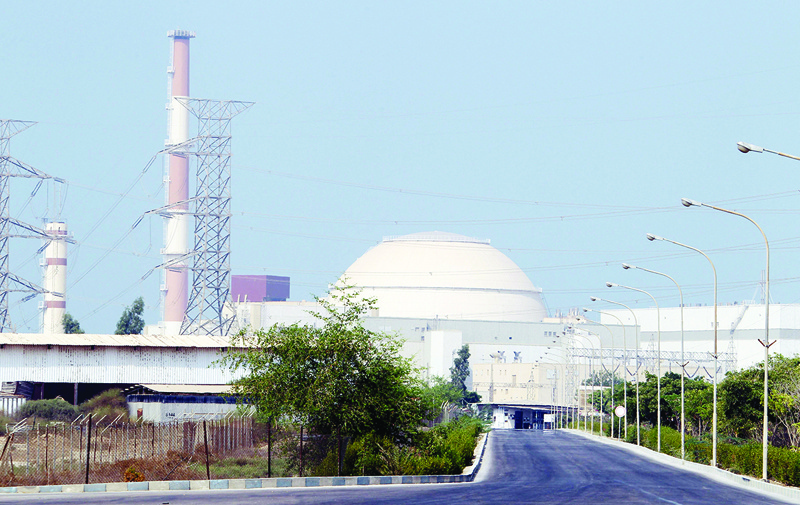 BUSHEHR, Iran: This file photo taken on Aug 20, 2010 shows the reactor building at the Bushehr nuclear power plant in southern Iran. - AFP
BUSHEHR, Iran: This file photo taken on Aug 20, 2010 shows the reactor building at the Bushehr nuclear power plant in southern Iran. - AFPTEHRAN: Iran's only nuclear power plant has been temporarily shut down as authorities gave on Monday conflicting reports on what looks like a regular maintenance operation. The Bushehr plant and its 1,000-megawatt reactor, on Iran's southern coast, were completed by Russia after years of delay and officially handed over in September 2013, raising regional concerns in what is an earthquake prone area.
The shutdown comes as Tehran and world powers attempt to revive a hobbled 2015 agreement on Iran's nuclear program in Vienna talks, which an EU negotiator said Sunday were moving "closer to a deal". That agreement is stanchly opposed by the Zionist entity, which Tehran has accused in the past of sabotage against its nuclear enrichment efforts.
"Following a technical fault at Bushehr power plant, and after a one-day notice to the energy ministry, the plant was temporarily shut down and taken off the power grid," the Atomic Energy Organization of Iran (AEOI) said on its website around Sunday midnight. The statement said the plant will be reconnected to the grid and the issue will be resolved "in a few days", but did not elaborate further.
Iran's national electricity company had in a statement on Sunday called on Iranians to minimize consumption during peak hours due to a "predicted rise in temperature" and "limitations in power generation due to ongoing repairs" at Bushehr. The company said that the repairs may continue until the end of the week, which is Friday in Iran.
'Routine'
Operating nuclear plants must regularly shut down for maintenance and to change the fuel supplying the reactor. Asked by reporters about the shutdown, foreign ministry spokesman Saeed Khatibzadeh described it as "routine", adding that the operation had been announced beforehand and carried out "once or twice each year".
But the latest AEOI statement, quoting its chief Ali Akbar Salehi, said a "major repairs operation and performance improvement" at the plant was done on May 26. The plant refreshed its fuel and went through repairs a year ago on June 22, according to the body. The AEOI's deputy chief, Mahmoud Jafari, said in late March that Iran was having a difficult time obtaining what is needed to run Bushehr because of US sanctions and warned of an imminent shutdown "if no solution is found".
Iran earlier this month paid off a $16.2 million debt to the United Nations and regained its voting rights, without explaining how it surmounted sanction-related difficulties similar to what Jafari had mentioned. Russian and Iranian firms began building two additional 1,000-megawatt reactors at Bushehr in 2016. Their construction was expected to take 10 years.
Iran's Gulf Arab neighbors have often raised concerns about the reliability of the facility and the risk of radioactive leaks in the event of a major earthquake. In April, Bushehr province was shaken by a 5.9-magnitude earthquake, leaving five people injured but causing "no damage" to the nuclear complex, according to authorities. Also in April, Iran accused the Zionist entity of being behind a "terrorist" attack on its Natanz uranium enrichment plant, after a "small explosion" at that facility's electricity distribution center.
Blackouts
Iran started rolling blackouts in May this year after Tehran and several other cities were hit by unannounced power cuts that sparked complaints from consumers and an apology from the energy minister. The shortages were blamed on heat, drought impacting hydropower generation, and surging electricity demand blamed in part on crypto-currency mining.
Power cuts in the peak summer months are not uncommon in Iran, but a government report last month said precipitation was down 34 percent compared to the country's long-term average, and warned of reduced water supplies for the year. Since late May, the energy ministry regularly notifies citizens of "potential blackouts" lasting at least two hours, unless consumption in their area drops.
Iran's outgoing President Hassan Rouhani last month announced a ban on all crypto-currency mining until September to reduce the pressure on the power grid. The Islamic republic has announced plans to construct 20 nuclear power plants in the long-term in order to reduce its reliance on fossil fuels. The 2015 nuclear deal promised Iran sanctions relief in return for limits on its nuclear program.
The deal was torpedoed in 2018 after the former US president Donald Trump unilaterally withdrew from it and reimposed punishing sanctions on the Islamic republic. Trump's successor Joe Biden favors rejoining the accord and the remaining parties are engaged in negotiations in Vienna to try to salvage it. - AFP









